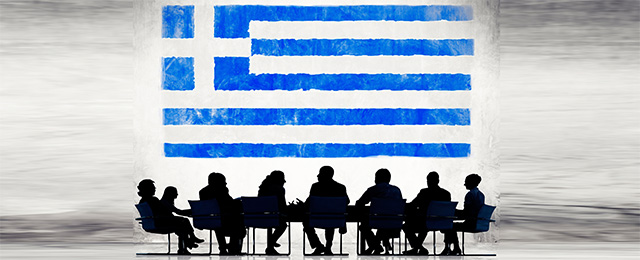Creditors readily acknowledge that Athens is flatly unable to repay them. Yet they refuse to envisage any debt restructuring, fearing it might foster profligate spending and wipe out any leverage in forcing reforms badly needed for redressing Greece’s dire economic plight. Any concession might lead to the widespread belief that fiscal discipline doesn’t pay off, as wrongdoing benefits from better treatment than uprightness and sacrifice. Volatility would hit the EZ as partners in that club seem free to honour their commitments at their own will.
Having lost any hope of properly addressing the Greek problem, creditors focus on downsizing the snowball of future liabilities for which they will have to foot the bill. No wonder they press for primary surpluses, even assuming Athens will fail to meet them, as well as cuts in big spending items which are easily checked like pensions. In exchange for such mild discipline, they are ready to provide extra cash and deliver a covert financial restructuring.
Greece’s strong demands for a restructuring of ECB and IMF short-term outstanding debt would make sense if it remained the only rescued and heavily indebted country. Otherwise, those countries facing severe constraints like Portugal or Ireland would feel entitled to follow suit. Furthermore, Tsipras fails to gauge the confidence gap which is sharply undermining any attempt at overhauling the unbearable financial burden his country suffers. As commitments have flatly failed to materialize so far, his partners cast deep-rooted doubts on Greece’s ability to deliver.
Syriza’s wild electoral promises have widened this confidence gap. That said, creditors are well aware of the huge danger that letting down Greece entails. It would not only undermine the EZ standing and credibility. It would also force them to salvage an economy plunging into dire distress and huge turmoil, forcing them to foot a higher bill than disbursing limited amounts of money based on hollow pledges.
European leaders would be well advised to reach a face saving deal, involving sacrifices that Tsipras can sell at home. Their target should be to prevent the Greek economy from collapsing while preserving debt restructuring as a key red line. Even if confronted with a Greek rebuttal of that offer, the ECB should refrain from cutting off ELA liquidity injections to financial institutions. A Grexit would bring about utter misery for this country, but also badly hit the EZ as a whole. No B plan has been prepared to counter the rampage on the euro likely to develop following Greece’s default. No emergency exits are available for preventing a widespread crisis.
Creditors will likely allow Greece enough room for manoeuvre to discuss the next rescue package. They should allocate extra funds for keeping its economy running even if they secure only hollow pledges in exchange. Otherwise, they are likely to face a grimmer outlook in their own backyard. It’s better dumping orthodoxy than facing a dismal outcome. It’s definitely better turning red than dead.






Be the first to comment on "Better red than dead"